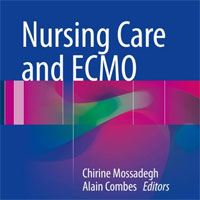Tag: study

Neonatal Early-Onset Sepsis Evaluation
Twelve years ago, we began a National Institutes of Health–funded study of neonatal early-onset sepsis (EOS) whose goal was to develop multivariate predictive models that could be used by clinicians to evaluate a newborn’s... read more

Platelet Function During ECMO in Adult Patients
Employing impedance aggregometry and flow cytometry, we found both impaired platelet aggregation and decreased platelet activation on day 1 of Extracorporeal Membrane Oxygenation (ECMO) support compared with healthy controls.... read more
Implementation of a Standardized Transfusion Protocol for Cardiac Patients Treated With Venoarterial ECMO Is Associated With Decreased Blood Component Utilization and May Improve Clinical Outcome
The data indicate that implementation of a standardized transfusion protocol, using more restrictive transfusion indications in cardiac ECMO patients, was associated with reduced blood product utilization, decreased complications,... read more

Mechanical Ventilation-induced Diaphragm Atrophy Strongly Impacts Clinical Outcomes
Diaphragm atrophy developing during mechanical ventilation strongly impacts clinical outcomes. Targeting an inspiratory effort level similar to that of healthy subjects at rest might accelerate liberation from ventilation.... read more

Determinants of Health-Related Quality of Life After ICU
Preexisting comorbidity counts, but not severity of ICU illness, are strongly associated with health-related quality of life and physical symptoms in the year following critical illness. We prospectively collected data... read more

The Complex Kinetics of Blood Endocan During the Time Course of Sepsis and ARDS
This study highlights the kinetics of endocan in severe sepsis and acute respiratory distress syndrome (ARDS), thus helping to understand the apparently conflicting results observed in the literature. However, the interpretability... read more

AKI in Critically Ill Patients After Noncardiac Major Surgery
Acute kidney injury (AKI) is a common complication of major surgery. However, acute kidney injury occurring within the first 48 hours after surgery (early acute kidney injury) and therefore likely related to the surgery itself... read more

Implementation Challenges in the ICU: The Why, Who and How of Daily Interruption of Sedation
Despite apparent consensus, lack of shared understanding of the rationale for an intervention may lead to divergent practice patterns and failure to implement standardized, evidence-based practice. There was wide consensus... read more

Early Mobilization Reduces Duration of Mechanical Ventilation and Intensive Care Unit Stay in Patients With ARF
The introduction of early mobilization for patients with mechanical ventilation (MV) in the ICU shortened MV durations and ICU stays. A multidisciplinary team that includes the patient's family can work together to improve... read more

Parenteral Anticoagulation Not Associated with Reduced Risk of Ischemic Stroke Among Patients with Atrial Fibrillation During Sepsis
Among patients with Atrial Fibrillation (AF) during sepsis, parenteral anticoagulation was not associated with reduced risk of ischemic stroke and was associated with higher bleeding rates. Of 113,511 patients hospitalized... read more

Causes and Consequences of Optimistic Expectations About Prognosis by Surrogate Decision-Makers in ICUs
This multicenter study shows that optimistic expectations about prognosis are prevalent among surrogates of patients with advanced critical illness, arise both from misunderstandings by surrogates and from surrogates holding... read more

Sedation and Analgesia Impact On Long-term Cognitive Dysfunction in Critical Care Survivors
Deep sedation during stay in the Intensive Care Unit (ICU) may have deleterious effects upon the clinical and cognitive outcomes of critically ill patients undergoing mechanical ventilation. Over the last decade a vast... read more

Determinants of Citation Impact in Large Clinical Trials in Critical Care
Clinical trials conducted by investigator-led research groups are significantly more frequently cited than industry-led trials in critical care medicine. In addition, costs appear to be substantially lower with investigator-led... read more

Transfusion Practice in the ICU
This study shows a group of MICU physicians altered transfusion practice after the publication of the TRICC trial results and that, in the years following, transfusion practice has remained closer to the restrictive transfusion... read more








